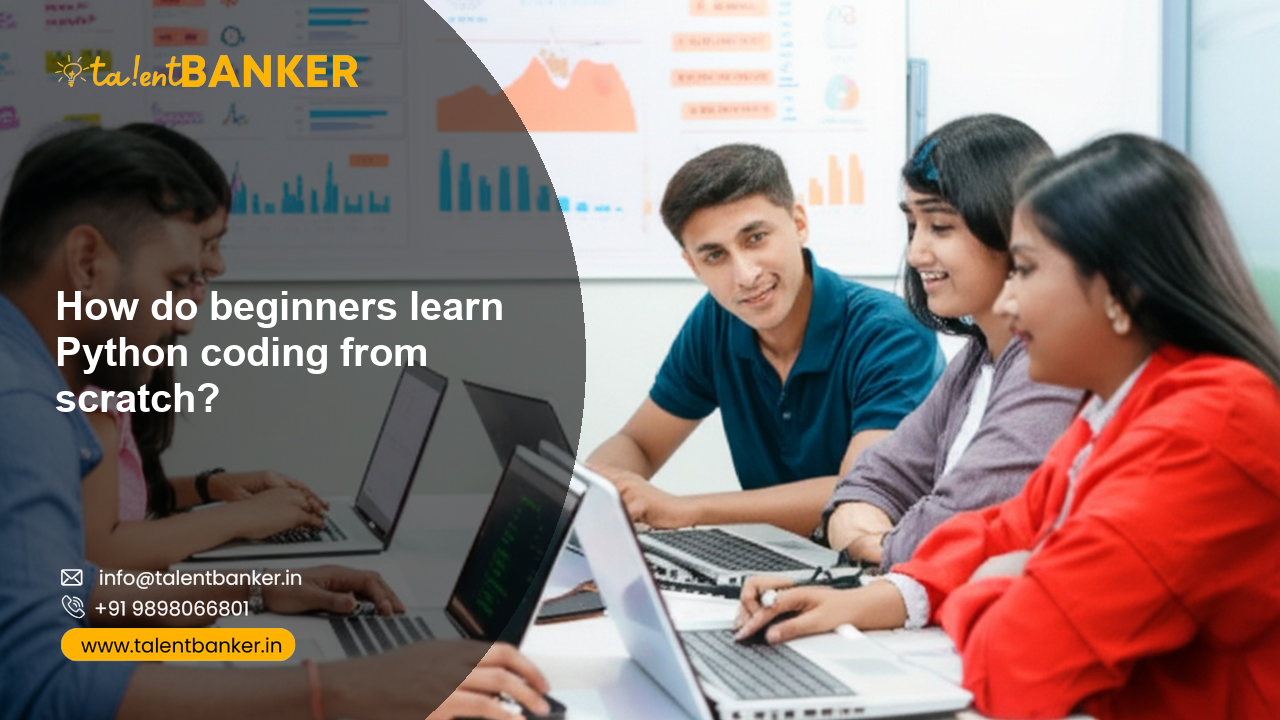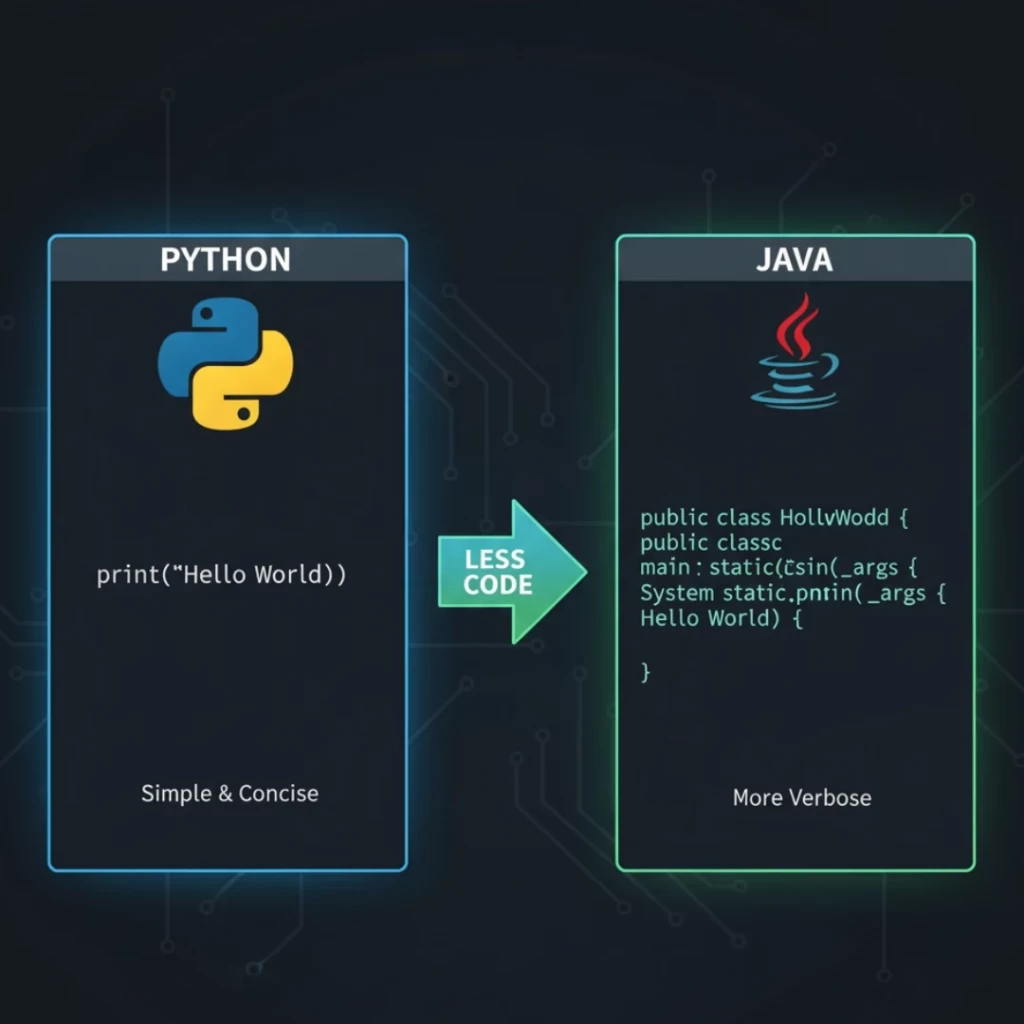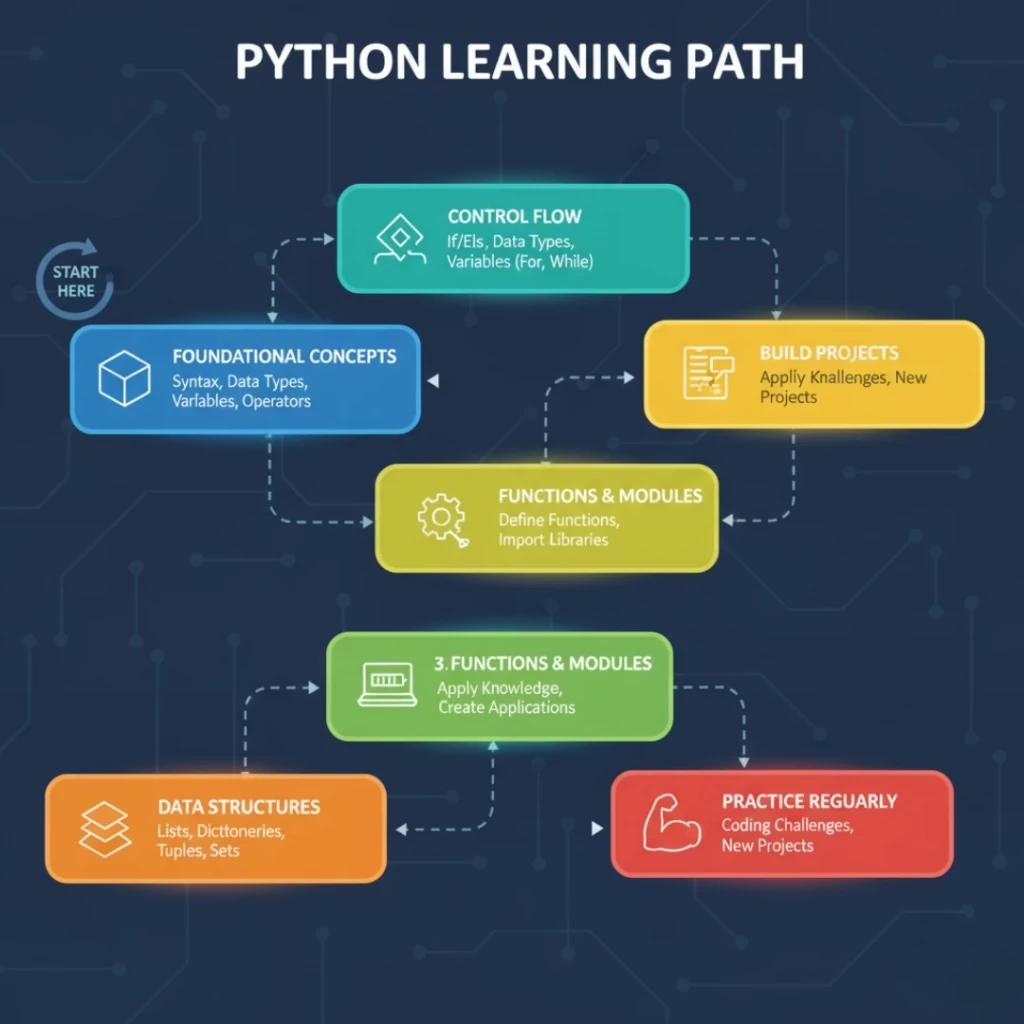How do beginners learn Python coding from scratch?
Embarking on a journey into the world of programming can feel daunting, but learning python for beginners is an excellent starting point that opens up a universe of possibilities.
Python, known for its clear and concise syntax, makes it remarkably easy to learn python coding, even if you’ve never written a single line of code before.
Its growing importance across industries, from web development to data science and artificial intelligence, makes it a highly sought-after skill in today’s job market.
This guide is specifically tailored for python coding for beginners, ensuring a smooth entry into the tech landscape.
We’ll cover why Python is so beginner-friendly, walk you through a step-by-step learning path, and explore options for finding a quality python course in Ahmedabad for those seeking local guidance and hands-on support.
Think of this as your friendly roadmap to becoming a confident Python coder!
Is Python Easy for Absolute Beginners?
Absolutely! Python is celebrated globally for its beginner-friendliness, and that’s why python coding for beginners is uniquely accessible. Here’s why it’s the perfect language to kickstart your programming adventure:
Simple Syntax and High Readability: Python’s structure closely resembles natural English. This means you spend less time deciphering complex grammar and more time understanding the logic.
For example, to display text, you simply typeprint("Hello World"), which is incredibly intuitive. This simplicity is a major reason why python for beginners is often recommended over other languages.
It’s like learning a new language that uses familiar words and grammar rules, rather than one with entirely new characters.
Vast and Active Community Support: When you learn python coding, you’re never alone. Python boasts one of the largest and most supportive communities.
Whether you’re stuck on a particular problem or just have a general question, platforms like Stack Overflow, Reddit communities (r/learnpython), and extensive online documentation are readily available.
Help is always a search away, ensuring a smoother learning curve.
Abundance of Beginner Tutorials and Comprehensive Documentation: The wealth of resources for new Python learners is incredible.
You’ll find countless free guides, video tutorials, and official Python documentation that are all designed with new learners in mind.
This ensures that python coding for beginners has a clear path to follow, with explanations tailored to their level.
Gentle Learning Curve: What does a “gentle learning curve” mean in practice? It means you can start writing useful and functional code very quickly, without needing to master every complex concept upfront.
You build proficiency step by step, seeing immediate results. It’s like learning to drive an automatic car first before tackling a manual transmission; you get to your destination faster and with less initial stress.
Immediate Practical Application: Python’s versatility means beginners can quickly see their code come to life.
You can use it for simple automation tasks, build basic web applications with frameworks like Flask, or dive into data analysis with libraries like Pandas.
This immediate gratification motivates freshers who are just starting to learn python coding, showing them the real-world impact of their skills.
Numerous Free Online Resources and platforms, such as Codecademy, freeCodeCamp, and W3Schools, offer interactive courses that allow you to code directly in your browser.
YouTube channels offer visual guides that break down complex topics into digestible lessons.
This makes getting started with python for beginners very low-cost or even free, allowing anyone to explore programming.
Step-by-Step Python Learning Path
Learning to code is an iterative process, and having a clear roadmap can make all the difference. This practical guide will help you effectively learn python coding.
- Start with Foundational Concepts: Variables, Data Types, and Basic Operations.
- Variables: Think of these as labeled boxes where you store information. For example,
name = "Alice"stores the text “Alice” in a box labeledname, andage = 30stores the number 30. - Data Types: This refers to the different kinds of information you can store. Common types include text (strings like “Hello”), whole numbers (integers like 10), decimal numbers (floats like 3.14), and True/False values (booleans).
- Basic Operations: Learn how to manipulate these values using arithmetic operations like addition (
+), subtraction (-), multiplication (*), and division (/). These form the absolute core of python coding for beginners.
- Variables: Think of these as labeled boxes where you store information. For example,
- Master Control Flow: Conditions (if/else) and Loops (for/while).
- Conditions (if/else): This is how your program makes decisions. Imagine deciding what to wear:
ifit’s sunny,thenwear sunglasses,else ifIt’s raining,thenTake an umbrella,elsewear a jacket. Python usesif,elif(else if), andelsestatements for this. - Loops (for/while): Loops are used to repeat actions. A
forloop is like telling a friend to collect five specific items from a list, performing the action for each item. Awhileloop is like telling them to keep searching for a lost itemwhilethey haven’t found it. You’ll useforloops to iterate over sequences andwhileloops to repeat actions as long as a certain condition is true.
- Conditions (if/else): This is how your program makes decisions. Imagine deciding what to wear:
- Understand Functions and Modules for Organizing Your Python Coding for Beginners.
- Functions: These are reusable blocks of code designed to perform a specific task. Think of a function like a recipe for a specific dish – you define it once (e.g.,
def greet(name):), then you can “call” it (use it) whenever you want to make that dish without rewriting the steps. This significantly simplifies python coding for beginners by breaking down complex problems into smaller, manageable parts. - Modules: Modules are simply Python files containing collections of functions, variables, and classes. They allow you to organize your code and reuse it across different projects. It’s like having a cookbook with many recipes; you can import just the recipes (functions) you need.
- Functions: These are reusable blocks of code designed to perform a specific task. Think of a function like a recipe for a specific dish – you define it once (e.g.,
- Build Small Projects to Apply Concepts and Reinforce Your Skills. This is where the magic happens and is absolutely crucial for python for beginners. Hands-on learning solidifies your theoretical knowledge. Start with simple projects:
- A basic calculator (addition, subtraction, etc.).
- A “Guess the Number” game.
- A command-line to-do list application.
- A simple text-based adventure game.
At TalentBanker, we strongly emphasize practical learning with real-world applications. Our courses are structured around hands-on projects, ensuring you not only learn the concepts but also build a portfolio that showcases your abilities.
- Explore Basic Data Structures like Lists, Dictionaries, and Tuples.
- Lists: Ordered, changeable collections of items (e.g.,
shopping_list = ["milk", "eggs", "bread"]). You can add, remove, or change items. - Dictionaries: Unordered collections of key-value pairs, perfect for storing related information (e.g.,
contact = {"name": "John", "phone": "123-4567", "email": "john@example.com"}). - Tuples: Ordered, unchangeable collections. Once created, you can’t modify a tuple.
Understanding when and how to use these data structures is vital for efficient programming and further enriches your ability to learn python coding.
- Lists: Ordered, changeable collections of items (e.g.,
- Practice Regularly with Coding Challenges to Solidify Your Ability to Learn Python Coding Effectively. Consistent practice is key to developing problem-solving skills. Websites like LeetCode (start with “Easy” problems), HackerRank, and CodeWars offer a plethora of coding challenges designed to test and improve your Python skills. Regular coding helps you transition from theoretical knowledge to practical application, making python for beginners concepts stick firmly in your mind.
Where to Learn Python in Ahmedabad
Ahmedabad’s tech scene is growing, and there are excellent options available if you’re looking for structured guidance to learn python coding, especially through a dedicated python course in Ahmedabad.
Explore Reputable Training Institutes Offering a Comprehensive Python Course in Ahmedabad. When choosing an institute, look for experienced instructors, an up-to-date curriculum that covers industry-relevant topics, and plenty of practical assignments.
Importantly, consider institutes that offer strong career support, including resume help, interview preparation, and placement guidance.
For instance, at TalentBanker in Ahmedabad, you’ll find comprehensive Python courses designed with beginners in mind.
Our curriculum focuses on hands-on projects and real-world application, ensuring you gain practical skills.
We also offer dedicated career support, including resume building, interview preparation, and placement assistance, to help you launch your IT career successfully. Visiting the institute and checking student testimonials can provide valuable insights.
Consider University Extension Programs for Structured, Academic Learning.Many universities in Ahmedabad, or those offering online programs, provide certificate or diploma courses in programming, often including Python.
These programs offer academic rigor, potentially recognized certifications, and a more theoretical-to-practical approach.
They can be a strong option for those who wish to learn python coding with a solid academic foundation.
Look for Online Platforms with Live, Interactive Sessions Tailored for Local Learners. The flexibility of online learning is undeniable. Many platforms offer live classes where you can interact directly with instructors and peers.
Some even provide specific batch timings tailored for Indian time zones, making it easier to fit a quality python course in Ahmedabad (or nearby regions) into your schedule without commute hassles. Look for recorded sessions for review.
Local Offline Classes Providing Hands-on Experience and Direct Instructor Support.For many python for beginners, the traditional classroom setting offers unique advantages.
In-person learning provides immediate feedback, encourages networking with fellow students, and creates a dedicated learning environment away from home distractions.
It allows for direct interaction with instructors who can guide you through complex concepts instantly.
Certificate Courses That Validate Your Newly Acquired Skills for Potential Employers. Completing a recognized certificate course is crucial for career advancement, as it validates your skills to potential employers.
When choosing a python course in Ahmedabad, inquire about the accreditation and industry recognition of the certificate you’ll receive upon completion.
A strong certificate can significantly boost your resume.
Practice Labs and Workshops to Apply Theoretical Knowledge in Real-World Scenarios.Theoretical knowledge is only half the battle.
Seek out programs that offer dedicated lab sessions, hackathons, or project-based workshops.
This practical application is vital for truly mastering python coding for beginners and building the confidence to tackle real-world problems.
At TalentBanker, our focus on hands-on projects across courses like Python, ReactJS, Node.js, and Graphic Design ensures you gain practical experience from day one.
Conclusion
The journey of learning python for beginners is both accessible and immensely rewarding.
Python’s straightforward syntax, extensive community support, and vast applications make it an ideal language for anyone looking to step into the world of technology.
By following a clear learning path, starting with basics, mastering control flow, building functions, working on projects, and practicing consistently, you can build a strong foundation.
Whether you choose to learn python coding through self-study or by enrolling in a quality python course in Ahmedabad like those offered at TalentBanker, remember that dedication and hands-on practice are your best allies.
With commitment, mastering python coding for beginners is well within your reach, opening doors to innovation and exciting career opportunities.
Start your Python journey today and unlock a world of innovation and opportunity!
Q1. How long does it take for a beginner to learn Python coding?
For python for beginners, grasping the fundamentals (syntax, variables, loops, functions) can take 2–3 months with consistent practice (1–2 hours daily). To become proficient enough for entry-level projects, expect 6–12 months. Enrolling in a structured python course in Ahmedabad at institutes like TalentBanker can significantly fast-track your learning due to expert guidance and hands-on projects.
Q2. Is Python coding difficult for someone with no programming background?
No, Python is considered one of the easiest programming languages for beginners. It’s simple, English-like syntax and high readability make python coding for beginners much less intimidating than other languages. The gentle learning curve means you can start writing useful code very quickly, building confidence as you go.
Q3. What can I do with Python after learning the basics?
Once you have a good grasp of python coding for beginners, you can explore various fields. You could start building simple web applications (using Flask or Django), perform data analysis (with Pandas and NumPy), automate repetitive tasks, create simple games, or even delve into machine learning. The practical application is immense, motivating you to continue to learn python coding.
Q4. Does TalentBanker offer career support for its Python courses in Ahmedabad?
Yes, at TalentBanker, our python course in Ahmedabad includes comprehensive career support. This covers resume building, interview preparation workshops, and dedicated placement guidance to help our students secure jobs in the IT industry. We focus on ensuring our learners are not just skilled but also job-ready.
Q5. What kind of projects should I work on as a beginner to learn Python coding effectively?
As you learn python coding, focus on small, manageable projects that apply the concepts you’ve learned. Great starter projects include a simple calculator, a number guessing game, a basic to-do list application, or a text-based adventure game. These hands-on projects are crucial for python for beginners to solidify understanding and build a foundational portfolio.



